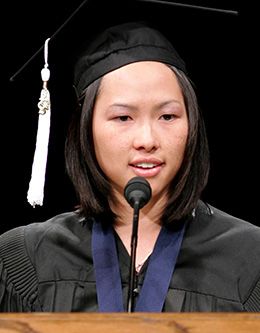When I first found out that I was to speak at commencement, I was really excited and naturally wanted to share the news with some of my friends. One of them happened to be chatting online with an old friend of mine from Singapore. He told her, “Val is valedictorian!”
Her response? “Really? All my life I thought Val stood for Valerie.”
What a great response. It certainly put things nicely into perspective.
Let me begin by sharing a little experience with you. One Monday night when I was a freshman living at Deseret Towers, our family home evening activity consisted of making cookies for students at the Testing Center. We had been planning this little service project for a week and were really looking forward to cheering up some tired test-takers. Pretty soon the cookies were made and we were on our way to the Testing Center. As we approached, we offered cookies to students we saw coming out of the building, but there were no takers. I must say we were somewhat puzzled. After all, why wouldn’t anyone want a nice, fresh cookie after a long, hard test?
Finally a student came out munching on a brownie. When he saw us, he grinned and said, “Wow, cookies too? There are already two groups in there with brownies and muffins!”
Our cookie experience was fun, although—as we eventually found out—not particularly necessary. In fact, in my time at BYU I’ve come to realize that the most needed service is rarely scheduled. I’ve met some wonderful friends and teachers, and these associations have taught me that the essence of service does not lie in planned projects but in being the kind of person people know they can call on when they need help, whenever that may be.
Perhaps the most unique thing about a BYU education is that it prizes eternal and not simply academic progression. This difference in priorities encourages both faculty and students to factor in service alongside their pursuit of knowledge. As Elder Neal A. Maxwell noted, “Knowledge is intended to travel in a convoy of other Christian virtues. It does not have final meaning by itself” (“The Inexhaustible Gospel,” BYU 1991–92 Devotional and Fireside Speeches [Provo: BYU, 1992], 141; see also adaptation of the address in Ensign, April 1993, 69).
I have seen Christian virtues traveling as companions of knowledge many times at BYU. I have seen them in the lives of friends who take time to listen to a roommate who has had a bad day, despite having papers due and pressing deadlines of their own. I’ve seen them in professors who leave their doors open all day so that students can walk in anytime when they have questions or would simply like to chat. I’ve personally known both the difficulty and joy of such service as part of my volunteer experience with the ACCESS program (Advocates for a Child’s Community Exposure and Socialization Success). I’ve been called unexpectedly the day before finals to spend the afternoon with a child whose mother couldn’t get off work. That certainly put an end to my studying, but it was well worth it. These small, yet profound acts of service are what give meaning and purpose to knowledge, and I’m so glad to have been part of a university that values service as much as it values knowledge.
Let me tell you the end of our little cookie delivery experience. After learning about the other two charitable food-bearing groups, we decided to go into the Testing Center and check it out. We ended up standing across from the muffin group with our cookies, trying to entice test-takers to choose our cookies instead of their muffins.
I have a feeling that many of us will soon be doing something similar to what I was doing that night—trying to persuade potential employers that our knowledge and skills are better than those of others. I believe that the knowledge I have gained at BYU has fully equipped me for the labor market. More important, however, my education here has helped me realize the importance of lifelong learning and service. As a result, the value of my education will not be determined by the demand and supply curves of the current job market or fade with age. It will instead be ever increasing and eternal. And for that I will always be grateful. Thank you.
© Brigham Young University. All rights reserved.

Shuei Chen Valerie Woo spoke as the representative of her graduating class at BYU commencement on 21 April 2005.

